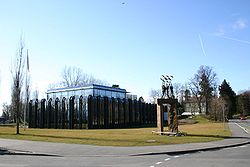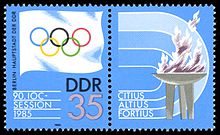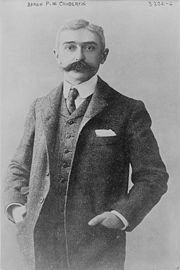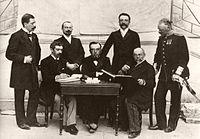- International Olympic Committee
-
Comité International Olympique
International Olympic Committee
Motto Citius Altius Fortius Formation 23 June 1894 Type Sports federation Headquarters  Lausanne, Switzerland
Lausanne, SwitzerlandMembership 204 National Olympic Committees Official languages French, English, and host country's official language when necessary President  Jacques Rogge
Jacques RoggeWebsite www.Olympic.org The International Olympic Committee (IOC) is an international corporation based in Lausanne, Switzerland, created by Pierre de Coubertin on 23 June 1894 with Demetrios Vikelas as its first president. Today its membership consists of the 205 National Olympic Committees (though Kuwait is suspended since 2010).
The IOC organizes the modern Olympic Games and Youth Olympic Games, held in Summer and Winter, every four years. The first Summer Olympics organized by the International Olympic Committee were held in Athens, Greece, in 1896; the first Winter Olympics were in Chamonix, France, in 1924. Until 1992, both Summer and Winter Olympics were held in the same year. After that year, however, the IOC shifted the Winter Olympics to the even years between Summer Games, to help space the planning of the two events two years apart from one another, and improve the financial balance of the IOC, that gets bigger income on Olympic years. The first Summer Youth Olympics were in Singapore in 2010 and the first Winter Youth Olympics are due to be held in Innsbruck in 2012.
Contents
Presentation
On 22 June 1894, the Olympic games were re-created as an international tournament by Pierre de Coubertin. The baron hoped to foster international communication and peace through the Olympic Games. The IOC is a parent organization intended to localize administration and authority for the Games, as well as to provide a single legal entity which owns copyrights, trademarks, and other intangible properties associated with the Olympic games. For example, the Olympic logos, the design of the Olympic flag, the motto, creed, and anthem are all owned and administered by the IOC. Data, as in the recording, broadcasting, reproduction, exploitation and anything relating to the organization is also the property of the IOC. There are other organizations which the IOC coordinates as well, which are collectively called the Olympic Movement. The IOC President is responsible for representing the IOC as a whole, and there are members of the IOC which represent the IOC in their respective countries.
Original members of the International Olympic Committee
Member Country From Until Notes Mario Lucchesi-Palli  Italy
Italy1894 1894 Demetrios Vikelas  Greece
Greece1894 1897 President (1894–1896) Arthur Russell, 2nd Baron Ampthill  Great Britain
Great Britain1894 1898 Alexei de Butowski  Russian Empire
Russian Empire1894 1900 Leonard A. Cuff  New Zealand
New Zealand1894 1905 Charles Herbert  Great Britain
Great Britain1894 1906 José Benjamín Zubiaur  Argentina
Argentina1894 1907 Ferenc Kemény  Hungary
Hungary1894 1907 Ernest Callot  France
France1894 1913 Treasurer (1894–1895) Viktor Balck  Norway-Sweden
Norway-Sweden1894 1921 William Milligan Sloane  United States
United States1894 1924 Baron Pierre de Coubertin  France
France1894 1925 General Secretary (1894–1896), President (1896–1925) Jiří Stanislav Guth-Jarkovský  Bohemia
Bohemia1894 1943 Presidents
No. Name Origin Date of birth/death Took office Left office Notes 1 Demetrius Vikelas  Greece
Greece15 February 1835
–
20 July 19081894 1896 2 Pierre de Coubertin  France
France1 January 1863
–
2 September 19371896 1925 Longest serving President
(29 years).— Godefroy de Blonay
(acting) Switzerland
Switzerland25 July 1869
–
14 February 19371916 1919 3 Henri de Baillet-Latour  Belgium
Belgium1 March 1876
–
6 January 19421925 1942 Died in office. 4 Johannes Sigfrid Edström  Sweden
Sweden21 November 1870
–
18 March 19641942 1952 5 Avery Brundage  USA
USA28 September 1887
–
8 May 19751952 1972 Only non-European member to hold the post. 6 Lord Killanin  Ireland
Ireland30 July 1914
–
25 April 19991972 1980 7 Juan Antonio Samaranch  Spain
Spain17 July 1920
–
21 April 20101980 2001 Second longest serving President
(21 years).8 Jacques Rogge  Belgium
Belgium2 May 1942
–
Present2001 scheduled for 2013 Second Belgian to hold the post. - source: [1]
Mission and role
The stated mission of the IOC is to promote Olympism throughout the world and to lead the Olympic Movement."Olympic Charter". Mission and role of the IOC. International Olympic Committee. http://olympic-museum.de/charter/olympiccharter_febr2010.pdf. Retrieved 9/20/2011.
The IOC's role is to:[1]
- Encourage and support the promotion of ethics in sport as well as education of youth through sport and to dedicate its efforts to ensuring that, in sport, the spirit of fair play prevails and violence is banned;
- Encourage and support the organization, development and coordination of sport and sports competitions;
- Ensure the regular celebration of the Olympic Games;
- Cooperate with the competent public or private organizations and authorities in the endeavor to place sport at the service of humanity and thereby to promote peace;
- Take action in order to strengthen the unity and to protect the independence of the Olympic Movement;
- Act against any form of discrimination affecting the Olympic Movement;
- Encourage and support the promotion of women in sport at all levels and in all structures with a view to implementing the principle of equality of men and women;
- Lead the fight against doping in sporting
- Encourage and support measures protecting the health of athletes;
- Oppose any political or commercial abuse of sport and athletes;
- Encourage and support the efforts of sports organizations and public authorities to provide for the social and professional future of athletes;
- Encourage and support the development of sport for all;
- Encourage and support a responsible concern for environmental issues, to promote sustainable development in sport and to require that the Olympic Games are held accordingly;
- Promote a positive legacy from the Olympic Games to the host cities and host countries;
- Encourage and support initiatives blending sport with culture and education;
- Encourage and support the activities of the International Olympic Academy (IOA) and other institutions which dedicate themselves to Olympic education.
Organization
The IOC Session
The IOC Session is the general meeting of the members of the IOC, held once a year in which each member has one vote. It is the IOC’s supreme organ and its decisions are final.
Extraordinary Sessions may be convened by the President or upon the written request of at least one third of the members.
Among others, the powers of the Session are:
- To adopt or amend the Olympic Charter.
- To elect the members of the IOC, the Honorary President and the honorary members.
- To elect the President, the Vice-Presidents and all other members of the IOC Executive Board.
- To elect the host city of the Olympic Games.
The IOC Executive Board
The IOC Executive Board consists of the President, four Vice-Presidents and ten other members. All members of the IOC Executive Board are elected by the Session, in a secret ballot, by a majority of the votes cast. The IOC Executive Board assumes the general overall responsibility for the administration of the IOC and the management of its affairs.
The IOC Session elects, by secret ballot, the IOC President from among its members for a term of eight years renewable once for a term of four years. The current IOC President, Jacques Rogge, was re-elected for a second term that consists of four years on 9 October 2009.[2] Former President Juan Antonio Samaranch has been elected Honorary President For Life.
Honours
In addition to the Olympic medals for competitors, the IOC awards a number of other honours:
- the IOC President's Trophy is the highest sports award given to athletes who have excelled in their sport and had an extraordinary career and created a lasting impact on their sport.
- the Pierre de Coubertin medal is awarded to athletes who demonstrate a special spirit of sportsmanship in Olympic events
- the Olympic Cup is awarded to institutions or associations with a record of merit and integrity in actively developing the Olympic Movement
- the Olympic Order is awarded to individuals for particularly distinguished contributions to the Olympic Movement, and superseded the Olympic Certificate.
Museum
- Main article: The Olympic Museum
Publications
The IOC publishes Olympic Review and Revue Olympique since 1894.[3][clarification needed]
IOC members
For most of its existence, the IOC was controlled by members who were co-opted, which means they were selected by other members. Countries that had hosted the Games were allowed two members, others one or none. When named, they became not representatives of their respective countries to the IOC, but rather the opposite, IOC members in their respective countries.
For a long time, members of royalty have been members of co-option, such as Prince Albert II of Monaco, as have former athletes. These last 10 years, the composition has evolved, in order to get a better representation of the sports world. Members seats have been allocated specifically to athletes, International Federations leaders and National Olympic Committees leaders.
Membership
The total number of IOC members may not exceed 115. Each member of the IOC is elected for a term of eight years and may be re-elected for one or several further terms.
- A majority of members whose memberships are not linked to any specific function or office; their total number may not exceed 70; there may be no more than one such member national of any given country;
- Active athletes, the total number of whom may not exceed 15, elected for eight years by their peers during the Olympic Games;
- Presidents or persons holding an executive or senior leadership position within IFs, associations of IFs or other organizations recognized by the IOC, the total number of whom may not exceed 15;
- Presidents or persons holding an executive or senior leadership position within NOCs, or world or continental associations of NOCs, the total number of whom may not exceed 15; there may be no more than one such member national of any given country within the IOC.
Cessation of membership
The membership of IOC members ceases in the following circumstances:[4]
- Resignation: any IOC member may cease their membership at any time by delivering his written resignation to the President.
- Non re-election: any IOC member ceases to be a member without further formality if they are not re-elected.
- Age limit: any IOC member ceases to be a member at the end of the calendar year during which they reach the age of 80.
- Failure to attend Sessions or take active part in IOC work for two consecutive years.
- Transfer of domicile or of main center of interests to a country other than the country which was theirs at the time of their election.
- Members elected as active athletes cease to be a member upon ceasing to be a member of the IOC Athletes’ Commission.
- Presidents and individuals holding an executive or senior leadership position within NOCs, world or continental associations of NOCs, IFs or associations of IFs or other organizations recognized by the IOC cease to be a member upon ceasing to exercise the function they were exercising at the time of their election.
- Expulsion: an IOC member may be expelled by decision of the Session if such member has betrayed their oath or if the Session considers that such member has neglected or knowingly jeopardized the interests of the IOC or acted in a way which is unworthy of the IOC.
Olympic marketing
In the early 1980s, the Olympics were on the verge of bankruptcy when the IOC drafted a team to help market the event and the organization.[5] In 1998, one of the members of that team, Michael Payne, became the first marketing director of the IOC.[5][6] During his 20 years with the IOC,[5] Payne created a multi-billion dollar marketing program for the organization which turned the Games around financially.[7][8][9]
Revenue
The Olympic Movement generates revenue through five major programs. The International Olympic Committee (IOC) manages broadcast partnerships and the TOP worldwide sponsorship program. The Organizing Committees for the Olympic Games (OCOGs) manage domestic sponsorship, ticketing and licensing programs within the host country under the direction of the IOC. The Olympic Movement generated a total of more than US$4 billion, €2.5 billion in revenue during the most recent Olympic quadrennium (2001–2004).
Revenue distribution
The IOC distributes some of Olympic marketing revenue to organizations throughout the Olympic Movement to support the staging of the Olympic Games and to promote the worldwide development of sport. The IOC retains approximately 8% of Olympic marketing revenue for the operational and administrative costs of governing the Olympic Movement.
The Organizing Committees of the Olympic Games (OCOGs)
The IOC provides TOP program contributions and Olympic broadcast revenue to the OCOGs to support the staging of the Olympic Games and Olympic Winter Games:
- TOP Program Revenue to OCOGs; the two OCOGs of each Olympic quadrennium generally share approximately 50% of TOP program revenue and value-in-kind contributions, with approximately 30% provided to the summer OCOG and 20% provided to the winter OCOG.
- Broadcast Revenue to OCOGs; the IOC contributes 49% of the Olympic broadcast revenue for each Games to the OCOG. During the 2001 – 2004 Olympic quadrennium, the Salt Lake 2002 Organizing Committee received US$443 million, €395 million in broadcast revenue from the IOC, and the Athens 2004 Organizing Committee received US$732 million, €690 million.
- Domestic Program Revenue to OCOGs; the OCOGs generate substantial revenue from the domestic marketing programs that they manage within the host country, including domestic sponsorship, ticketing and licensing.
National Olympic Committees (NOCs)
The NOCs receive financial support for the training and development of Olympic teams, Olympic athletes and Olympic hopefuls. The IOC distributes TOP program revenue to each of the NOCs throughout the world. The IOC also contributes Olympic broadcast revenue to Olympic Solidarity, an IOC organization that provides financial support to NOCs with the greatest need.
The continued success of the TOP program and Olympic broadcast agreements has enabled the IOC to provide increased support for the NOCs with each Olympic quadrennium. The IOC provided approximately US$318.5 million to NOCs for the 2001 – 2004 quadrennium.
International Olympic Sports Federations (IFs)
The IOC is now the largest single revenue source for the majority of IFs, with its contributions of Olympic broadcast revenue that assist the IFs in the development of their respective sports worldwide. The IOC provides financial support from Olympic broadcast revenue to the 28 IFs of Olympic summer sports and the seven IFs of Olympic winter sports after the completion of the Olympic Games and the Olympic Winter Games, respectively.
The continually increasing value of Olympic broadcast partnership has enabled the IOC to deliver substantially increased financial support to the IFs with each successive Games. The seven winter sports IFs shared US$85.8 million, €75 million in Salt Lake 2002 broadcast revenue. The contribution to the 28 summer sports IFs from Athens 2004 broadcast revenue has not yet been determined, but the contribution is expected to mark a significant increase over the US$190 million, €150 million that the IOC provided to the summer IFs following Sydney 2000.
Other organizations
The IOC contributes Olympic marketing revenue to the programs of various recognized international sports organizations, including the International Paralympic Committee, and the World Anti-Doping Agency (WADA).
Bidding to host the games
Countries bidding to host the Summer Olympic Games or the Winter Olympic Games compete aggressively to have their bid accepted by the IOC. The IOC members, representing most of the member countries, vote to decide where the Games will take place. Members from countries which have cities bidding to host the games are excluded from the voting process, up until the point where their city drops out of the contest.
In recent years, the contest for the right to host the games has grown increasingly fierce and controversial. Allegations were leveled after the 1996 Olympics that Atlanta Committee for the Olympic Games (ACOG) organizers bribed members of the IOC to obtain the Olympic Games. However, ACOG documents were destroyed prior to a formal inquiry and the allegations remain unproven. In his defense, ACOG Chairman Billy Payne said "Atlanta's bidding effort included excessive actions, even thought processes, that today seem inappropriate but, at the time, reflected the prevailing practices in the selection process and an extremely competitive environment". In 2002, Salt Lake City was involved in a bribery scandal but earlier stories, reported by British journalists Vyv Simson and Andrew Jennings,[10] date back decades. Corruption in the IOC has been documented by numerous investigations. After the Salt Lake City scandal in which a number of IOC members were expelled following an extensive investigation, efforts were made to clamp down on abuses of the bid city process. More stringent rules were introduced and an advisory board of recently retired former athletes was set up. Critics of the organization believe more fundamental reform is required, for instance replacing the self-perpetuating system of delegate selection with a more democratic process.
Even legal attempts to sway the IOC to accept a city's bid can spark controversy, such as Beijing's successful bid to host the 2008 Summer Olympics. Several human rights organizations spoke out against the poor human rights condition of China, in conflict with the Olympic Charter of the IOC.[11]
In an August 2007 interview on the Beijing 2008 website, IOC President Jacques Rogge said, the IOC "definitely would love to see the continents that have not yet organized the Games like Africa or Latin America do that in the future. I cannot tell you exactly when, but I will see it in my life... We believe in the near future we can determine the host country under this rotating system. As of now, we haven't set a timetable for starting this system".[12] Rogge also said that he would like the IOC to give chance for the games to be held in Third World nations like Haiti, Cambodia, and Cameroon within 2020 and beyond.[13]
Controversies
Salt Lake Bid Scandal
Scandal broke on 10 December 1998, when Swiss IOC member Marc Hodler, head of the coordination committee overseeing the organization of the 2002 games, announced that several members of the IOC had taken bribes. Soon four independent investigations were underway: by the IOC, the USOC, the SLOC, and the United States Department of Justice.
Before any of the investigations could even get under way both Welch and Johnson resigned their posts as the head of the SLOC. Many others soon followed. The Department of Justice filed charges against the two: fifteen charges of bribery and fraud. Johnson and Welch were eventually acquitted of all criminal charges in December 2003.
As a result of the investigation ten members of the IOC were expelled and another ten were sanctioned.[14] This was the first expulsion or sanction for corruption in the more than a century the IOC had existed. Although nothing strictly illegal had been done, it was felt that the acceptance of the gifts was morally dubious. Stricter rules were adopted for future bids and ceilings were put into place as to how much IOC members could accept from bid cities. Additionally new term and age limits were put into place for IOC membership, and fifteen former Olympic athletes were added to the committee.
In 2006, a report ordered by the Nagano region's governor said the Japanese city provided millions of dollars in an "illegitimate and excessive level of hospitality" to IOC members, including $4.4 million spent on entertainment alone.[15]
International groups attempted to pressure the IOC to reject Beijing's bid in protest of the state of human rights in the People's Republic of China. One Chinese dissident who expressed similar sentiments was arrested and sentenced to two years in prison for calling on the IOC to do just that at the same time that IOC inspectors were touring the city.[16] Amnesty International expressed concern in 2006 regarding the Olympic Games to be held in China in 2008, likewise expressing concerns over the human rights situation. The second principle in the Fundamental Principles of Olympism, Olympic Charter states that The goal of Olympism is to place sport at the service of the harmonious development of man, with a view to promoting a peaceful society concerned with the preservation of human dignity.[17] Amnesty International considers the policies and practices of the People's Republic as failing to meet that principle, and urged the IOC to press China to immediately enact human rights reform.[18]
In August 2008, the IOC issued DMCA take down notices on Tibetan Protest videos of the Beijing Olympics hosted on YouTube.[19] YouTated for the Public Eye Awards. This award seeks to present "shame-on-you-awards to the nastiest corporate players of the year".[20]
Women's Ski Jumping
The 2010 Vancouver Winter Olympics saw controversy surrounding women's ski jumping. Ski jumping is the last remaining Olympic sport that bars women from competing. The International Olympic Committee (IOC) says the exclusion of women is not discrimination. President Jacques Rogge has insisted that the decision "was made strictly on a technical basis, and absolutely not on gender grounds." But female would-be Olympic competitors say they do not understand what that "technical basis" is and wonder if he was referring to their abilities. They point to American Lindsey Van, who holds the world record for the single longest jump by anyone, male or female. Ironically, she broke the record flying from a jump built at Whistler for the Vancouver Olympics. They argued the numbers of top-level women ski jumpers are satisfactory too. When the IOC voted in 2006 not to add women's ski jumping, 83 competitors from 14 nations jumped at the top level, less universality than required to add a new event. But in the same year, women's ski cross claimed just 30 skiers from 11 nations. The committee added it.[21]
See also
- Association of International Olympic Winter Sports Federations (AIOWF)
- Association of IOC Recognised International Sports Federations (ARISF)
- Association of Summer Olympic International Federations (ASOIF)
- International Paralympic Committee
- International Academy of Sport Science and Technology (AISTS)
- SportAccord
References
- ^ cite web|title=Olympic Charter|url=http://olympic-museum.de/charter/olympiccharter_febr2010.pdf%7Cwork=Mission and role of the IOC|publisher=International Olympic Committee|accessdate=9/20/2011
- ^ "IOC re-elects President Jacques Rogge". Olympic.org. 9 October 2009. http://www.olympic.org/en/content/Media/?articleNewsGroup=&articleId=73403.
- ^ "Olympic Review and Revue Olympique". AAFLA. http://www.aafla.org/5va/review_frmst.htm. Retrieved 11 April 2006.
- ^ Source: Olympic Charter, in force as from 1 September 2004.
- ^ a b c "IOC Marketing Supremo: Smile, Beijing". china.org.cn. 6 August 2008. http://www.china.org.cn/olympics/news/2008-08/06/content_16143673.htm. Retrieved 23 February 2011.
- ^ "How the IOC took on Nike in Atlanta". Sports Business Journal Daily (Sports Business Journal). 11 July 2005. http://www.sportsbusinessdaily.com/Journal/Issues/Archive/SBJ-In-Depth/2005/07/How-The-IOC-Took-On-Nike-In-Atlanta.aspx. Retrieved 23 February 2011.
- ^ "London Bid 'Has Improved'". sportinglife.com. http://www.sportinglife.com/others/news/story_get.cgi?STORY_NAME=others/05/02/14/manual_103457.html. Retrieved 23 February 2011.
- ^ "Boost for London's Olympic Bid". RTÉ Sport. 14 February 2005. http://www.rte.ie/sport/2005/0214/olympics.html. Retrieved 23 February 2011.
- ^ Campbell, Struan (22 October 2008). "Payne – London 2012 to tap fountain of youth". Sportbusiness.com. http://www.sportbusiness.com/print-edition/payne-london-2012-tap-fountain-youth. Retrieved 23 February 2011.
- ^ Simson & Jennings (1992). The Lord of The Rings. Power, Money and Drugs in the Modern Olympics. Shuster & Shuster. ISBN 0-671-71122-9.
- ^ http://multimedia.olympic.org/pdf/en_report_122.pdf "Olympic Charter, in force as from 7 July 2007", International Olympic Committee
- ^ GamesBids.com – Olympic Bid News and Information Website
- ^ GamesBids.com – Olympic Bid News and Information Website
- ^ "Samaranch reflects on bid scandal with regret". 2002 Winter Olympics coverage. Deseret News Archives. 19 May 2001. http://www.deseretnews.com/oly/view/0,3949,35000108,00.html.
- ^ Mainichi Daily News ends its partnership with MSN, takes on new Web address
- ^ Bodeen, Christopher (25 February 2001). "Beijing opens itself up to Olympic inspectors". Chicago Sun-Times. http://www.findarticles.com/p/articles/mi_qn4155/is_20010225/ai_n13899744.
- ^ http://multimedia.olympic.org/pdf/en_report_122.pdf "Olympic Charter, in force as from 1 September 2004", International Olympic Committee
- ^ http://web.amnesty.org/library/index/engASA170462006?open&of=eng-CHN "People’s Republic of China: The Olympics countdown – failing to keep human rights promises" Amnesty International, 21 September 2006
- ^ IOC backs off DMCA take-down for Tibet protest http://www.thestandard.com/news/2008/08/14/video-ioc-backs-dmca-take-down-tibet-protest
- ^ http://www.publiceye.ch/en/nominations/ioc/
- ^ http://motherjones.com/media/2010/02/did-olympic-committee-discriminate-against-female-ski-jumpers
Further reading
- Chappelet, Jean-Loup; Brenda Kübler-Mabbott (2008). International Olympic Committee and the olympic system: the governance of world sport. New York: Routledge. ISBN 978-0-415-43167-5.
External links
Links to related articles International Olympic Committee ANOCs · IFs · NOCs · OCOGs Association of National Olympic Committees All-African Games · Asian Games · Pan American Games Africa 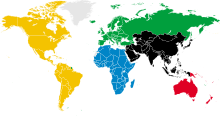
Americas PASO – Pan American Sports OrganizationAsia OCA – Olympic Council of AsiaEurope Oceania International Sports Federations Federations of Olympic Summer Games FINA (Aquatic Sports) • FITA (Archery) • IAAF (Athletics) • BWF (Badminton) • FIBA (Basketball) • AIBA (Boxing) • ICF (Canoeing) • UCI (Cycling) • FEI (Equestrianism) • FIE (Fencing) • FIFA (Football) • IGF (Golf) • IFG (Gymnastics) • IHF (Handball) • FIH (Field hockey) • IJF (Judo) • UIPM (Modern pentathlon) • FISA (Rowing) • IRB (Rugby union) • ISAF (Sailing) • ISSF (Shooting) • ITTF (Table tennis) • WTF (Taekwondo) • ITF (Tennis) • ITU (Triathlon) • FIVB (Volleyball) • IWF (Weightlifting) • FILA (Wrestling)
Federations of Olympic Winter Games International Olympic Committee Categories:- International Olympic Committee
- Olympics
- Sports rules and regulations
- International sports bodies based in Switzerland
- Organisations based in Lausanne
- 1894 establishments
- United Nations General Assembly observers
Wikimedia Foundation. 2010.

